Disc Replacement Surgery in Treating Degenerative Disc Disease
Living with Degenerative Disc Disease (DDD) can significantly impact one’s quality of life, often leading to chronic pain, reduced mobility, and diminished overall well-being. Fortunately, advancements in medical technology have paved the way for innovative treatment options that offer hope and relief to individuals grappling with this debilitating condition. In this comprehensive article, we delve into a multifaceted approach to addressing DDD, exploring the effectiveness of cutting-edge treatments in restoring spinal health and enhancing the lives of those affected.
Spine Disc Replacement
At the forefront of modern medical interventions is spine disc replacement, a revolutionary approach that harnesses the body’s innate healing mechanisms to repair damaged tissues and promote regeneration. Unlike traditional treatments that merely manage symptoms, this targets the underlying cause of DDD, addressing tissue degeneration and facilitating the restoration of spinal function. By employing this technique, healthcare professionals can stimulate tissue repair and regeneration, offering patients long-term relief from pain and improved mobility. With a focus on promoting natural healing processes, this represents a promising avenue for individuals seeking alternatives to traditional interventions.
Advanced Implant Technology
In recent years, remarkable advancements in implant technology have transformed the landscape of DDD treatment, providing patients with minimally invasive alternatives to traditional surgical procedures. By utilizing state-of-the-art implants engineered to replicate the structure and function of natural spinal connectivity, healthcare providers can restore stability and flexibility to the spine, alleviating pain and improving overall function. With shorter recovery times, reduced risk of complications, and improved long-term outcomes, patients can confidently embrace this innovative approach to DDD management, knowing they are receiving the highest standard of care available. From artificial disc replacements to dynamic stabilization systems, the range of implant options offers tailored solutions to meet the diverse needs of patients with varying degrees of DDD severity.
Personalized Rehabilitation Programs
In conjunction with innovative treatment modalities, personalized rehabilitation programs play a pivotal role in optimizing outcomes for individuals with DDD. These tailored programs are meticulously designed to address the unique needs and goals of each patient, encompassing a comprehensive range of therapeutic interventions, including targeted exercises, physical therapy, and lifestyle modifications. By actively engaging in their disc replacement surgery journey, patients can accelerate the healing process, strengthen supporting musculature, and regain functional independence, ultimately enhancing their overall quality of life. With guidance from experienced rehabilitation specialists, individuals with DDD can develop sustainable habits and strategies to manage their condition effectively and minimize the risk of future complications.
Comprehensive Support and Education:
Navigating the complexities of DDD treatment can be overwhelming, underscoring the importance of comprehensive support and education throughout the care continuum. Healthcare providers are committed to empowering patients with the knowledge and resources necessary to make informed decisions about their treatment options and actively participate in their care. From initial consultation to post-operative follow-up, patients can expect compassionate guidance and support, ensuring a seamless and positive experience throughout their treatment journey. By fostering open communication and collaboration, healthcare teams can cultivate a partnership with patients, fostering trust and confidence in their ability to achieve optimal outcomes. Through educational initiatives and resources, patients can gain a deeper understanding of their condition and treatment options, enabling them to play an active role in their recovery and long-term spinal health.
In conclusion, the landscape of Degenerative Disc Disease (DDD) treatment has evolved significantly, offering individuals affected by this condition a renewed sense of hope and possibility. Disc replacement surgery, utilizes techniques of removing the damaged part and putting the new artificial one in place, providing long-lasting relief from pain and improved mobility. Advanced implant technology provides minimally invasive alternatives to traditional surgical procedures, restoring stability and flexibility to the spine with shorter recovery times and reduced risk of complications. Personalized rehabilitation programs, encompassing targeted exercises and lifestyle modifications, enhance the overall quality of life by accelerating healing and promoting functional independence. Comprehensive support and education empower patients to make informed decisions about their care, fostering trust and confidence in achieving optimal outcomes. As we continue to innovate in spinal care, individuals with DDD can anticipate a future marked by restored mobility and vitality, overcoming the constraints of pain and limited mobility with determination and the guidance of dedicated healthcare professionals.


Comments are closed.